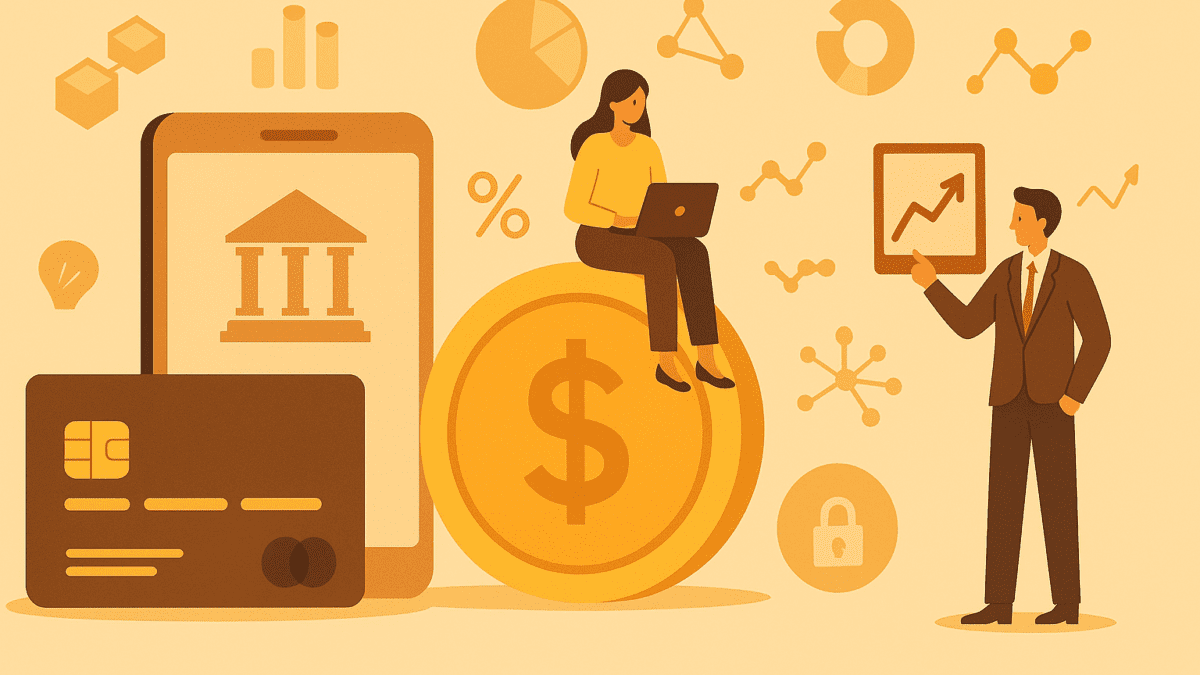What Is FinTech? The Future of Finance in 2025 and Beyond
Table of Contents
Introduction
The financial world is no longer dominated by traditional banks and outdated systems. Welcome to the era of FinTech—short for Financial Technology—a rapidly evolving industry reshaping how we save, borrow, invest, and spend money.
But what exactly is FinTech, and why is it so important in 2025?
What Is FinTech?
FinTech refers to the use of technology to deliver financial services more efficiently, securely, and affordably. From mobile banking apps to AI-powered lending platforms, FinTech merges finance with innovation.
It spans several categories, including:
- Digital Payments (e.g., Google Pay, PayPal)
- Online Lending & Credit Platforms (e.g., Upstart, LendingClub)
- Personal Finance Apps (e.g., Mint, YNAB)
- WealthTech (e.g., Robinhood, Zerodha)
- InsurTech (e.g., Lemonade, PolicyBazaar)
- RegTech (regulatory technology for compliance and KYC)
- Blockchain & Cryptocurrencies (e.g., Bitcoin, Ethereum, Solana)
Why FinTech Matters in 2025
The FinTech revolution is driven by four major forces:
- Digital Transformation: Consumers want faster, more accessible financial solutions.
- Financial Inclusion: FinTech bridges gaps for the unbanked and underbanked populations.
- Regulatory Support: Governments are recognizing FinTech as essential to economic growth.
- Innovation Acceleration: AI, ML, and blockchain are unlocking new business models.
According to Statista, the global FinTech market is expected to reach $312.5 billion by 2025, making it one of the fastest-growing industries in the world.
Key FinTech Innovations to Watch
- AI-Powered Financial Services: Artificial Intelligence is enabling better credit scoring, fraud detection, and customer support via chatbots and predictive analytics.
- Example: Companies like Zest AI and Kensho are helping banks reduce risk and personalize lending.
- Open Banking & API Integrations: Open Banking allows third-party apps to access user financial data securely through APIs, driving innovation in budgeting, investing, and lending tools.
- Buy Now, Pay Later (BNPL): Platforms like Affirm and Razorpay have made BNPL a common feature at checkout, enabling affordability and boosting merchant conversions.
- Decentralized Finance (DeFi): Built on blockchain, DeFi platforms eliminate intermediaries by offering peer-to-peer financial services such as lending and staking with smart contracts.
Challenges Facing the FinTech Sector
While FinTech is booming, it’s not without hurdles:
- Cybersecurity risks: Data breaches can damage customer trust.
- Regulatory complexity: Navigating global financial laws is daunting.
- Market saturation: Too many similar startups dilute user trust.
- Access to capital: Funding has become more selective post-2023 tech corrections.
Startups and scaleups must ensure compliance, robust cybersecurity, and clear differentiation to survive and grow.
How Businesses Can Leverage FinTech in 2025
Whether you’re a startup, SME, or large enterprise, integrating FinTech solutions can boost efficiency, reduce costs, and enhance customer experience.
Step-by-Step Guide:
- Evaluate Your Financial Pain Points
- Are you losing time with manual invoicing or reconciliation?
- Is your payment process outdated?
- Select the Right Tools
- Use Stripe or Razorpay for online payments.
- Use QuickBooks or Zoho Books for accounting automation.
- Integrate with CRM or ERP
- Connect FinTech tools with CRM (e.g., HubSpot) for better insights.
- Automate reporting and forecasting.
- Monitor KPIs
- Track transaction volumes, payment success rates, and cost-per-payment.
- Stay Compliant
- Partner with RegTech providers to streamline KYC/AML checks.
Real-World Example: India’s FinTech Boom
India has become a global FinTech leader with 7,000+ startups and major players like PhonePe, Paytm, and PolicyBazaar transforming everyday finance.
- UPI (Unified Payments Interface) processes over 11 billion transactions monthly (as of 2025).
- Digital wallets now rival banks in user base and daily active usage.
Final Thoughts
The FinTech wave is here—and it’s not slowing down. From AI and blockchain to digital wallets and lending apps, FinTech is revolutionizing how businesses and individuals handle money.
Whether you’re looking to optimize your operations, launch a new FinTech product, or simply stay ahead in a competitive market—understanding and embracing FinTech is no longer optional. It’s essential.
Ready to Transform Your Financial Strategy?
Explore how B2B brands grow faster with smarter FinTech adoption—Start here with iTMunch’s lead generation services.
See Also: The SEC’s Latest Ruling on Crypto ETFs and What It Means for Investors





